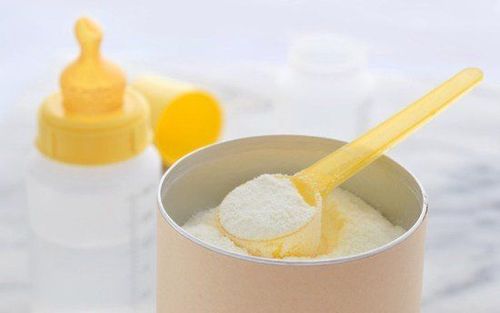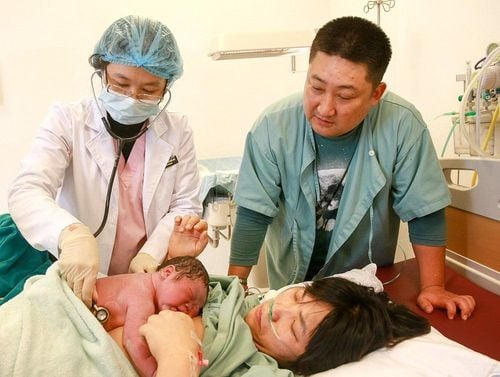This is an automatically translated article.
Posted by Specialist Doctor I Trieu Thi Hong Thai - Neonatology Department - Vinmec Times City International Hospital
A premature baby is a baby born before 37 weeks of age and weighing less than 37 weeks of age. Babies born with a small gestational age are often at risk of dangerous complications. Therefore, nutrition for premature babies is very important, parents need to pay special attention.
1. What if your premature baby can't eat breast milk right away?
If your baby was born prematurely or has health problems, he or she may not be able to get breast milk right away by any means, including breast-feeding or bottle-feeding. But you should try to express your milk after giving birth. The hospital may keep breast milk in the refrigerator for later feeding. This makes a lot of sense if a premature baby may not be able to eat breast milk for a longer period of time. In fact, stimulating and expressing milk soon after birth has the effect of keeping the mother's milk regular every day and will help stabilize the mother's milk supply during lactation.
If you have difficulty expressing milk after giving birth or giving birth, you can ask medical staff for support, because this is certainly a problem that many postpartum mothers face. You may only get a few drops in your first milking, but it's colostrum or colostrum, which carries nutrients and many antibodies that help protect your baby. In particular, breast milk also helps the baby's brain development. At first, your baby may have to get nutrition through parenteral nutrition. The nutrient solution contains sugars, amino acids (from proteins), mineral salts and fats.
Babies can eat breast milk through a tube (a gastric tube placed from the mouth to the stomach). You will still be able to skin-to-skin with your baby while he or she eats the lipstick, and there will be medical staff to support you, which will build a bond that will help your baby get ready for the next step. Currently, some hospitals have breast milk banks, donated milk from other mothers.
Your doctor may recommend adding nutrients to your baby's breast milk so that the baby can fully absorb the nutrients. In addition, babies can also use special formula for premature babies, so mothers do not need to worry too much.

Sinh non có thể khiến bé không ăn được sữa mẹ
2. How can I help my baby start breastfeeding?
Babies usually don't know how to breastfeed well until after 34 weeks of age in the womb. So if you were born before this time, your baby may need time to get better at breastfeeding on his own. You can then help get your baby ready for mastery. Once your baby is ready for milk, breast milk is best for him. Breast milk has special benefits for babies, because premature babies are more susceptible to infections and breast milk gives them better protection, it also helps babies digest well and in the long run helps babies stay healthy, grow and develop. evenly developed.The method of holding your baby kangaroo, with skin to skin is also a great way to help mother and child get ready for breastfeeding. This allows your baby a chance to smell your breast milk, pacify, and touch your nipples. In fact, there's a lot of good evidence that Kangaroo care can be suggested when you're ready, to increase your chances of breastfeeding later. Contact with the baby also helps stimulate more breast milk.
When the baby is stronger, the baby knows how to coordinate the movements when sucking better (sucking, swallowing, breathing), the baby can learn to eat milk by bottle or spoon, then breast-feeding.
3. Some extra energy for premature babies
Breast milk is the best source of nutrition, but premature babies sometimes need more energy. Some energy can be supplemented for children as follows:
3.1. Fortifier
Your baby's doctor may recommend concurrent Fortifier support. They help add nutrients to breast milk, helping the milk source have more energy, protein, mineral salts and vitamins. Fortifiers are meant to help your baby grow and develop better bones
3.2. Special formula milk
Newborns may also need special formula while in the hospital. Your doctor can advise you on the option that may be best for your baby.
Babies can use special formula for premature babies in the first few months after discharge from the hospital. Formula for premature babies has more calories than regular milk. Your baby can continue to use it until formula is ready.

Sữa công thức bổ sung năng lượng cho trẻ sinh non
3.3. Probiotics
Beneficial bacteria (Probiotics) help protect your baby from the risk of infection. Probiotics contain beneficial bacteria or yeast. Studies have shown that probiotics reduce the risk of necrotizing enterocolitis and infection, which can affect a baby's digestion.
Premature babies need special care and nutrition to compensate for their energy in the womb. Therefore, the nutrition of premature babies is not only sufficient but also must ensure many other important criteria for the child to absorb and develop comprehensively.
In addition to the above substances, parents should also supplement children with supporting products containing lysine, essential micro-minerals and vitamins such as zinc, chromium, selenium, B vitamins to help fully meet nutritional needs. substances in children. At the same time, these essential vitamins also support digestion, enhance nutrient absorption, help improve anorexia, and help children eat well. Parents can simultaneously apply dietary supplements and functional foods derived from nature for easy absorption. Most importantly, improvement in your baby's condition often takes a long time. Combining many types of functional foods at the same time or changing many types in a short time can make the baby's digestive system unable to adapt and completely not good. Therefore, parents must be really patient with their children and regularly visit the website vimec.com to update useful baby care information.














